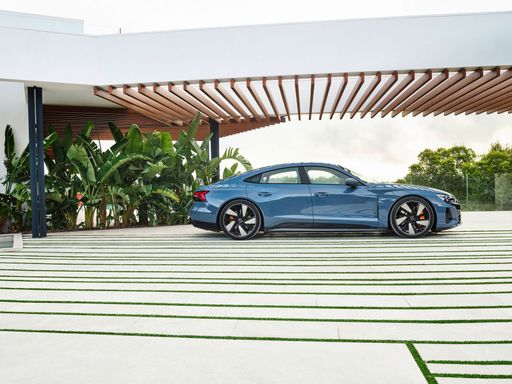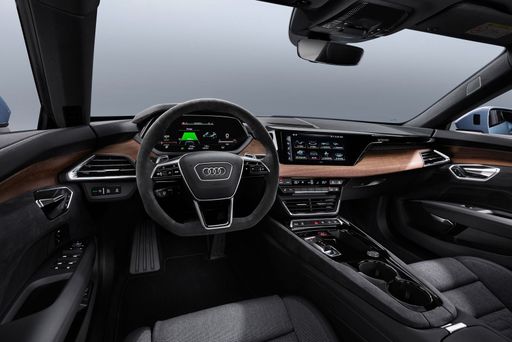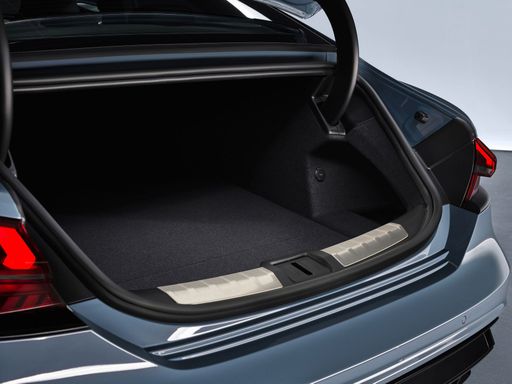Audi e-tron GT VS Nissan Leaf
Audi e-tron GT
The Audi e-tron GT showcases a harmonious blend of luxurious design and electrifying performance, making it a standout in the realm of electric vehicles. Its sleek, aerodynamic contours are not just for show; they contribute to a driving experience that's as smooth as it is exhilarating. Inside, the cabin exudes an air of sophistication, offering cutting-edge technology and premium materials that speak to Audi's commitment to quality and innovation.
more informationNissan Leaf
The Nissan Leaf stands out as a pioneering model in the realm of electric vehicles, known for its impressive blend of practicality and eco-friendliness. It offers a smooth and quiet driving experience, making it an ideal choice for city commuting and longer journeys alike. The interior design is both comfortable and intuitive, providing drivers with a sense of modernity and ease of use.
more information @ audi-mediacenter.com
@ audi-mediacenter.com
 @ audi-mediacenter.com
@ audi-mediacenter.com
 @ audi-mediacenter.com
@ audi-mediacenter.com
 @ audi-mediacenter.com
@ audi-mediacenter.com
 @ audi-mediacenter.com
@ audi-mediacenter.com
 @ audi-mediacenter.com
@ audi-mediacenter.com
 @ audi-mediacenter.com
@ audi-mediacenter.com
 @ audi-mediacenter.com
@ audi-mediacenter.com
 @ germany.nissannews.com
@ germany.nissannews.com
 @ germany.nissannews.com
@ germany.nissannews.com
 @ germany.nissannews.com
@ germany.nissannews.com
 @ germany.nissannews.com
@ germany.nissannews.com
Costs and Consumption |
|
|---|---|
|
Price
about 108000 - 137600
£
|
Price
about 30800 - 37200
£
|
|
Consumption L/100km
-
|
Consumption L/100km
-
|
|
Consumption kWh/100km
18.2 - 19
kWh
|
Consumption kWh/100km
16.7 - 17.8
kWh
|
|
Electric Range
582 - 605
km
|
Electric Range
270 - 385
km
|
|
Battery Capacity
97
kWh
|
Battery Capacity
39 - 59
kWh
|
|
co2
0
g/km
|
co2
0
g/km
|
|
Fuel tank capacity
-
|
Fuel tank capacity
-
|
Dimensions and Body |
|
|
Body Type
Coupe
|
Body Type
Hatchback
|
|
Seats
4
|
Seats
5
|
|
Doors
4
|
Doors
5
|
|
Curb weight
2385 - 2395
kg
|
Curb weight
1580 - 1756
kg
|
|
Trunk capacity
350 - 405
L
|
Trunk capacity
385 - 394
L
|
|
Length
4989 - 4997
mm
|
Length
4490
mm
|
|
Width
1964
mm
|
Width
1788
mm
|
|
Height
1379 - 1414
mm
|
Height
1540 - 1545
mm
|
|
Payload
455 - 465
kg
|
Payload
384 - 415
kg
|
Engine and Performance |
|
|
Engine Type
Electric
|
Engine Type
Electric
|
|
Transmission
Automatic
|
Transmission
Automatic
|
|
Transmission Detail
Reduction Gearbox
|
Transmission Detail
Reduction Gearbox
|
|
Drive Type
All-Wheel Drive
|
Drive Type
Front-Wheel Drive
|
|
Power HP
679 - 925
HP
|
Power HP
150 - 217
HP
|
|
Acceleration 0-100km/h
2.5 - 3.4
s
|
Acceleration 0-100km/h
6.9 - 7.9
s
|
|
Max Speed
245 - 250
km/h
|
Max Speed
144 - 157
km/h
|
|
Torque
895 - 995
Nm
|
Torque
320 - 340
Nm
|
|
Number of Cylinders
-
|
Number of Cylinders
-
|
|
Power kW
500 - 680
kW
|
Power kW
110 - 160
kW
|
|
Engine capacity
-
|
Engine capacity
-
|
|
Top speed
245 - 250
km/h
|
Top speed
144 - 157
km/h
|
General |
|
|
Model Year
2024
|
Model Year
2019
|
|
CO2 Efficiency Class
A
|
CO2 Efficiency Class
A
|
|
Brand
Audi
|
Brand
Nissan
|
Audi e-tron GT
Introducing the Audi e-tron GT: A Fusion of Elegance and Performance
The Audi e-tron GT sets a new standard in the realm of electric vehicles, blending extraordinary performance with sophisticated design and unparalleled technology. As one of Audi's flagship electric models, it demonstrates the perfect synergy between sustainability and thrill.
Performance Unleashed: Power and Efficiency
The Audi e-tron GT comes equipped with an all-electric powertrain that delivers between 679 and 925 PS. This vehicle offers rapid acceleration, going from 0 to 100 km/h in just 2.5 to 3.4 seconds, depending on the model. With a maximum torque of up to 995 Nm, driving enthusiasts can expect instantaneous response and relentless dynamics on every journey.
Despite its high performance, the e-tron GT maintains impressive efficiency with a consumption rate ranging from 18.2 to 19 kWh per 100 km. This efficiency enables a remarkable electric range of between 582 to 605 km, thanks to its substantial 97 kWh battery capacity. With a CO2 output of zero, the Audi e-tron GT stands as an exemplar of green transportation, reflecting the brand's commitment to sustainability.
Advanced Engineering: Quattro and Beyond
The e-tron GT features Audi's iconic quattro all-wheel-drive system, ensuring superior traction and stability under any driving condition. Coupled with a reduction gear transmission, this setup grants the vehicle precision handling and a truly engaging driving experience.
Additionally, the model includes adaptive air suspension and dynamic steering, enhancing riding comfort and precise control, whether navigating through urban streets or cruising on the motorways.
Design Excellence: Form Meets Function
Visually, the Audi e-tron GT is a masterpiece of automotive design, exuding a dynamic yet refined aesthetic. With dimensions stretching from 4989 to 4997 mm in length and a broad 1964 mm in width, it commands a significant presence on the road without sacrificing aerodynamics. This coupe features a sleek silhouette and muscular lines that highlight its sporty nature while contributing to optimal airflow and efficiency.
The interior continues the theme of sophisticated engineering, with a focus on driver-centric design and high-quality materials. Offering sumptuous comfort for four passengers, it features advanced digital displays and an intuitive interface equipped with the latest infotainment and connectivity options.
Innovation in Safety and Convenience
The e-tron GT does not compromise on safety, featuring an array of driver assistance systems. These technologies include adaptive cruise control, lane departure warnings, and emergency braking assistance, all designed to create a safe, worry-free driving experience.
Moreover, the e-tron GT includes practical innovations such as rapid charging capabilities, an essential convenience for today's electric vehicle drivers. With fast-charging options, drivers can quickly recharge the vehicle, making it an excellent companion for long-distance travels.
Conclusion: A Visionary Step Forward
The Audi e-tron GT is more than just a car; it's a vision of the future. Balancing cutting-edge technology, breathtaking performance, and eco-conscious engineering, it epitomises what the future of driving looks like. As we continue the transition toward electrification, the e-tron GT stands as a testament to Audi's dedication to leading the charge with style and innovation.
Nissan Leaf
Introduction to the Nissan Leaf: A Pioneer in Electric Mobility
The Nissan Leaf has established itself as a trailblazer in the realm of electric vehicles (EVs) since its launch. As we delve into its present-day iterations, the Leaf continues to soar in popularity due to remarkable advancements in technology and sustainability. Let's explore what makes the Nissan Leaf a standout in today's automotive market.
Power and Performance: Under the Hood of the Nissan Leaf
The Nissan Leaf boasts a power output ranging from 150 to 217 PS, depending on the battery option chosen. The vehicle's electric motor, a product of cutting-edge engineering, offers instant torque ranging from 320 to 340 Nm, resulting in impressive acceleration capabilities. The 0 to 100 km/h dash is achieved in as little as 6.9 seconds, showcasing its prowess in electric performance.
Battery Technology: Efficient Energy Management
When discussing the Nissan Leaf, battery technology is at the forefront. The available battery capacities range from 39 to 59 kWh, supporting an electric range between 270 to 385 km. This flexibility allows drivers to choose a model that best fits their driving habits, providing peace of mind for longer journeys without frequent recharging.
Sustainability: The Environmental Edge
One of the primary attractions of the Nissan Leaf is its commitment to sustainability. As an all-electric vehicle, it produces zero CO2 emissions, placing it in the top tier of the CO2-efficiency class with an 'A' rating. This clean energy approach contributes significantly to reducing environmental impact and supports Nissan's drive towards a greener future.
Design and Comfort: Aesthetic Appeal and Practicality
The Nissan Leaf is not just about efficiency; it's also designed for comfort and utility. With its sleek hatchback body and dimensions of 4490 mm in length, 1788 mm in width, and a height of up to 1545 mm, it offers ample interior space. The boot capacity ranges from 385 to 394 litres, providing sufficient storage for everyday needs. The model accommodates five passengers comfortably, ensuring a pleasant ride for everyone.
Innovations and Safety: Advanced Features for Peace of Mind
Nissan equips the Leaf with an array of intelligent features that enhance safety and convenience. The available equipment lines, including N-CONNECTA, Tekna, e+ N-CONNECTA, and e+ Tekna, offer varying levels of technology integration. ProPILOT Assist, e-Pedal, and a comprehensive suite of driver-assistance technology are just a few examples that highlight Nissan's commitment to innovation in the EV market.
Conclusion: The Nissan Leaf Continues to Lead
With prices ranging from €35,900 to €43,400, the Nissan Leaf remains an attractive choice for those looking to embrace electric mobility. It perfectly balances performance, design, and sustainability, making it a compelling choice in the competitive EV landscape. The Nissan Leaf not only represents the future of driving but also reinforces why it continues to be a leader in the electric vehicle community.
